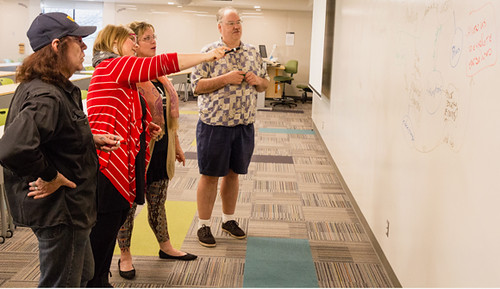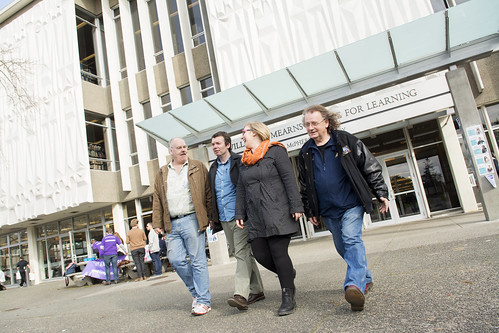Celebrating 10 years of making change
Graduate Studies, Continuing Studies, Humanities, Social Sciences
- Tara Sharpe
Updated: April 6, 2016
An introduction to poetry, eye witness memory, neuropolitics, the politics of the refugee crisis in a Canadian context, a short history of early Protestantism in England and functions of the human immune system. These are just some of the many topics covered in Uni 101, Uni 102 and Uni 201 - a program at UVic offering free, non-credit university courses to people who face significant barriers to post-secondary education.
On March 31, University 101 celebrated its 10th anniversary.

Above: Program Coordinator Becky Cory with (l-r) Uni 101 program graduates and volunteers Desi Sloan, Terry MacDonald, Alex Pitblado in Mearns Centre/McPherson Library. Credit: UVic Photo Services.
The genesis of the UVic program was sparked more than 10 years ago, when a handful of UVic postdocs and faculty members (Kristin Semmens, Lynne Marks, Elizabeth Vibert and Jessica Schafer of the Dept. of History), Kari Jones from Camosun College and local community members Darcy Merrick and Anthea Whittaker came together to discuss the possibility of launching a barrier-free university course for people who, for reasons of poverty, disability, single parenthood or a history of mental illness, would otherwise have no access to higher education on campus.
Founding concepts, flourishing programs
"I wanted to start something at UVic because of my experience teaching at UBC's Hum 101," says Semmens. "It's an incredible program - there are some parallels with what we offer our students, but some important differences as well." Semmens's initiative was realized thanks to support of then Dean of Humanities Andrew Rippin.
Since the Clemente course in the Humanities was first offered 20 years ago in New York City, initiatives have flourished across North America and abroad; for instance, the UBC program is one of the longest running in Canada. The founding concept focused not on vocational job training, but on what the humanities, liberal arts and social science disciplines know so well: teaching skills in critical thinking and reflection.
More than 350 students have completed the UVic program to date, with classes averaging 30 to 35 students. Twice as many people apply to Uni 101 as can be admitted.
UVic's Uni 101 program focuses on a collaborative and democratic approach: alumni are involved on the program's steering committee; some also participate in a year-long leadership program developed by and for Uni 101 graduates; and others serve as volunteer facilitators in the classrooms.
Uni 101 studies the humanities, from Plato's Athens to modern advertising. Uni 102 delves into the social sciences, from ethnobotany to psychology.
Above: (l-r) Uni 101 members James Cain, Cory, Vanessa Stetton and Pitblado in a UVic Smart Classroom. Credit: Jacob Zinn / Saanich News.
"We call the student leaders 'student liaisons,'" explains Uni 101 Program Coordinator Becky Cory. "One of our participants once said, 'Don't call me a mentor. I don't want to be a leader "above" other people.' That kind of critical thinking is imbued in the whole program. Then we all eat a meal together - instructors, volunteers and students. It 'humanizes' everyone and breaks the idea that university professors are 'above.' Along with critical thinking, this is really what's at the core of this program."
The program is also constantly being shaped and improved by the vision of its students and alumni - thanks to Cory's coordination efforts.
A constant evolution: 10 years and counting
Cory started working with the UVic program two months before the first course began. (Read more about Cory in the recent Ring column.) Launched by the Faculty of Humanities in spring 2006, the program was expanded to the Faculty of Social Sciences in spring 2007.
James Cain, a Uni 101 graduate and program volunteer, says the program has "legitimized the way I think, and my life experience. I've taken ownership of my life experience and it's a constant evolution - thinking and becoming more 'me.'"
Alex Pitblado, another program graduate and volunteer, described how a Uni 201 class this month called Plots, Papists and Puritans about post-Reformation England "really resonated for me. It's about how the British started rejecting both extremes and how the middle course is reasonable." The class arrived at a comparison to the ancient divide between Sunnis and Shia in the history of Islam.
Vanessa Stetton, currently a Uni 102 student, says the program has been "life-changing. It's opened up my mind to the possibilities of learning and the most important part is my confidence in myself."
Making knowledge accessible: bridges, not walls
All four program members joined more than 150 people at the 10th anniversary celebration March 31. Opening remarks included insights from UVic Chancellor Shelagh Rogers who spoke about "bridges" instead of "walls" in the context of the theme of the event: making knowledge accessible.
Terry MacDonald, also a Uni 101 program graduate and volunteer, was part of the panel that evening - alongside Stetton, Semmens and Dean of Social Sciences Catherine Krull - and reflected on an example of the bridging of knowledge without walls or borders deep into the downtown community: an earlier class on campus had explored the concept of "borders" and MacDonald subsequently overheard two people not enrolled in the program theorizing about those very same notions which they'd heard secondhand.
Three evening classes a week, thanks to generous support
Cory and her team of facilitators run three evening classes a week, one for alumni students of the program and two social sciences or humanities classes. UVic professors and graduate students volunteer their time to teach the classes and the program is funded by the university (in particular, by the deans of Continuing Studies, Humanities and Social Sciences, VPAC, the Division of Student Affairs and, most recently, the dean of Graduate Studies, as well as support from the UVSS) and through individual donations and in-kind sponsorship.
Many students decide to pursue their education further through Uni 201, a course for Uni 101 graduates which offers shorter month-long courses.
Over the past 10 years, staff in UVic's Departments of Gender Studies and History have provided significant administrative support to the program. Meals are provided at the beginning of each class, and bus tickets and child care subsidies are also available to the students to reduce material barriers to participation; but the program continues to face a shortfall in covering those costs.
Above: Pitblado, MacDonald, Cory, Sloan. Credit: UVic Photo Services.
Find out more
The application deadline for Uni 101 this fall is mid-July 2016. Uni 101 classes run from September through December; Uni 102 is January through Apri.
If you wish to become involved as a supporter, or require application information for either Uni 101 or 102, please visit uvic.ca/uni101 or contact Cory at uni101@uvic.ca or 250-721-6516.


